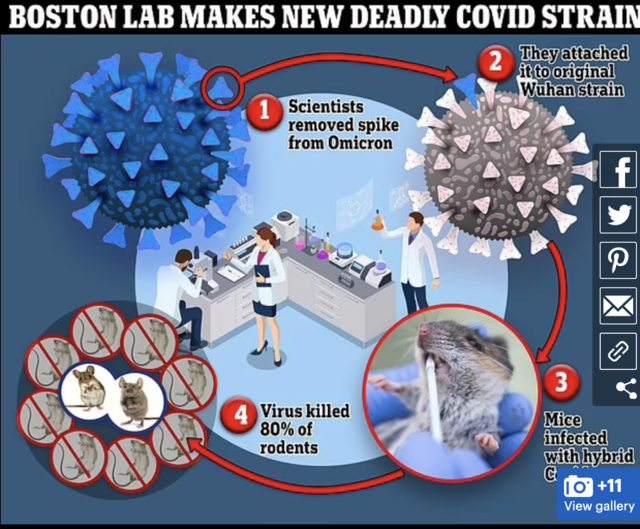
 
     |
| 80% kill-rate, huh ? (Page 1/2) |

|
MidEngineManiac
|
OCT 17, 12:25 PM
|
|
|

|
rinselberg
|
OCT 17, 01:10 PM
|
|
| quote | The scientists admit the hybrid virus is unlikely to be as deadly in humans as it was in mice.
This is because the specific breed of lab mice used are very susceptible to severe Covid disease. Mice and humans also have very different immune responses to the virus.
The lab, at Boston University's National Emerging Infectious Diseases Laboratories, is one of 13 biosafety level 4 labs in the US.
These are labs that are authorized to handle the most dangerous pathogens. There are also facilities in Texas, Atlanta and Manhattan, Kansas.
Experiments at these labs often involve tinkering with animal viruses to advance treatments and vaccines that could be used in a future outbreak. |
|
[This message has been edited by rinselberg (edited 10-17-2022).]
|
|

|
Hudini
|
OCT 18, 08:22 AM
|
|
|
That's what they said about the Wuhan lab.
|
|

|
rinselberg
|
OCT 18, 08:38 AM
|
|
"Evidence suggests [Covid] pandemic came from nature, not a lab, panel says"
| quote | The acrimonious debate over the origins of the COVID-19 pandemic flared up again this week with a report from an expert panel concluding that SARS-CoV-2 likely spread naturally in a zoonotic jump from an animal to humans—without help from a lab.
“Our paper recognizes that there are different possible origins, but the evidence towards zoonosis is overwhelming,” says co-author Danielle Anderson, a virologist at the University of Melbourne. The report, which includes an analysis that found the peer-reviewed literature overwhelmingly supports the zoonotic hypotheses, appeared in the Proceedings of the National Academy of Sciences (PNAS) on 10 October. . . . |
|
The article continues online.
Jon Cohen for Science; October 10, 2022.
https://www.science.org/con...e-not-lab-panel-says[This message has been edited by rinselberg (edited 10-18-2022).]
|
|

|
MidEngineManiac
|
OCT 18, 11:58 AM
|
|
 [This message has been edited by MidEngineManiac (edited 10-18-2022).]
|
|

|
MidEngineManiac
|
OCT 18, 11:59 AM
|
|
|
I guess if ya **** it up the 1st time, try again.
|
|

|
rinselberg
|
OCT 18, 12:51 PM
|
|
| quote | | The scientists admit the hybrid virus is unlikely to be as deadly in humans as it was in mice. This is because the specific breed of lab mice used are very susceptible to severe Covid disease. Mice and humans also have very different immune responses to the virus. |
|
I think this bears repeating. As it's a tale "Of Mice and Men".
|
|

|
Jake_Dragon
|
OCT 18, 12:52 PM
|
|
| quote | Originally posted by rinselberg:
"Evidence suggests [Covid] pandemic came from nature, not a lab, panel says"
The article continues online.
|
|
I wonder how much that cost them.
|
|

|
Hudini
|
OCT 18, 10:58 PM
|
|
And still no one has found Covid in an animal in the wild. Hmmmm...
|
|

|
rinselberg
|
OCT 19, 03:33 PM
|
|
| quote | Boston University scientists have created a hybrid version of the coronavirus that causes COVID-19. Their experiments sparked controversy, with heated headlines claiming that the researchers made the virus more lethal and university officials denouncing these claims as "false and inaccurate."
The new omicron spike-carrying virus — built by attaching the spike protein from an omicron version of the virus to the original SARS-CoV-2 virus — killed 80% of lab mice infected with it, making it more severe than the original omicron variant which didn’t kill any infected mice. Yet the hybrid virus was still less deadly than the original Wuhan variant of the virus, which killed 100% of infected lab mice. |
|
| quote | "We want to address the false and inaccurate reporting about Boston University COVID-19 research, which appeared today in the Daily Mail," Boston University said in a statement. "First, this research is not gain-of-function research, meaning it did not amplify the Washington state SARS-CoV-2 virus strain or make it more dangerous. In fact, this research made the virus replicate less dangerous." (The "Washington state SARS-CoV-2 strain" refers to a sample of the original Wuhan strain gathered in Washington in the early pandemic.)
Ronald B. Corley, the director of NEIDL, said in the statement that the Daily Mail report "sensationalized the message" and misrepresented "the study and its goals in its entirety."
"The animal model that was used was a particular type of mouse that is highly susceptible, and 80 to 100 percent of the infected mice succumb to disease from the original strain, the so-called Washington strain," Corley said. "Whereas Omicron causes a very mild disease in these animals." |
|
That's taken from a new report in Live Science by Ben Turner.
https://www.livescience.com...s-sparks-controversy[This message has been edited by rinselberg (edited 10-19-2022).]
|
|
    
  |
|















